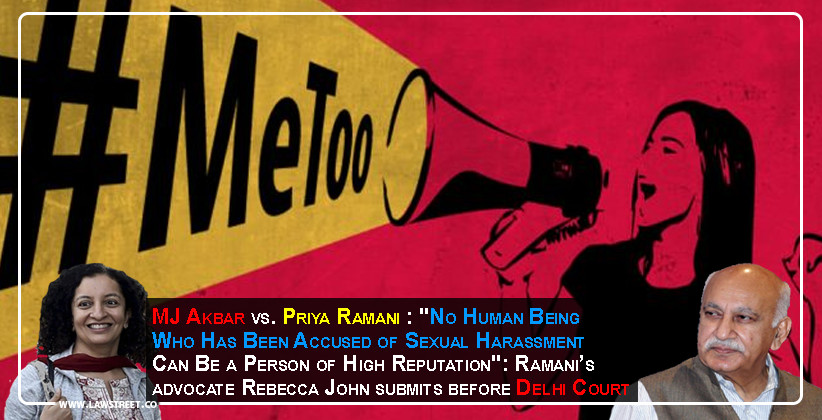The criminal defamation case filed by complainant, Former Union Minister Mr. M.J. Akbar against journalist Ms. Priya Ramani was heard on Wednesday (January 27, 2021). The case was heard by the Delhi Court judge, Additional Chief Metropolitan Magistrate, Ravindra Kumar Pandey.
The case is presently in its final stages and will conclude once Ms. Johnn concludes her final arguments. When Senior Advocate Geeta Luthra concluded her rebuttal arguments against the accused, i.e. Ms. Priya Ramani, it was followed by a counter argument made by Ms. Rebecca John appearing for Priya Ramani in the matter.
BACKGROUND OF THE CASE:
During the #MeToo movement in India in 2018, Ramani had accused Akbar of sexual harassment. He resigned from his position after that and filed a defamation case against Ramani. Akbar has repeatedly said that Ramanis allegations tarnished his impeccable reputation.
REBUTTAL ARGUMENTS BY ADV. GEETA LUTHRA
Ms. Luthra's arguments rested on the following three contentions and also relied on a plethora of judgments to substantiate her points:
- That the accused Priya Ramani had failed to discharge the onus of proof in proving the serious allegations made against Mr. MJ Akbar
For this contention, Ms. Luthra relied on the case of Sewakram Sobhani vs R.K. Karanjia (1981) wherein the Supreme Court observed that-
It is for the accused to plead Exception in defense and discharge the burden to prove good faith which implies the exercise of due care and caution and to show that the attack on the character was for the public good.
- That the incidents which are mentioned by the accused especially the meeting in a Mumbai Hotel do not fall within the category of res gestae.
- The ninth exception under sec. 499 of the Indian Penal Code, 1860 (IPC) ( imputations made in good faith) cannot be said to have met in this case.
For this, heavy reliance was made on the judgment of Sukra Mahto v. Basdeo Mahto (1971) wherein it was held that-
The ingredients of the Ninth Exception are firfirst that the imputation must be in good faith, secondly the imputation must be for protection of the person making it or of any other person or for the public good.
According to Ms. Luthra, the statements made by the accused, Ms. Priya Ramani were per se defamatory. She further argued that the allegations made against Mr. Akbar were in fact based on blind truth and without exercising due care and caution.
She also relied on the judgment of K Sundaram v. Unknown (2000) wherein the court ruled that before a person proposes to make imputation on another, the author must first make an enquiry into the imputation which he proposes to make. It is not enough that he does just a make-believe show for an enquiry.
Ms. Luthra concluded her rebuttal arguments by submitting that:
"My reputation has been harmed. I seek justice. I have no other way to get redressal and I have irreparably been harmed in my reputation, in my name which I have built in about 50 years of hard work and efforts."
ARGUMENTS BY ADV. REBECCA JOHN
Adv. Reebecca John began by arguing that merely because Priya Ramani did not name Mr. Akbar in the 2017 article and later named him in another article written in 2018, it does not take away the credibility of the allegations made against him by Ms. Ramani.
How many times will I have to prove my allegations? she said.
On the allegations of plagiarism made against Ms. Ramani, she said that stating that she had copied the contents of various articles. She further said that her purpose of using the phrases "Watch me shower" "Can I give you a bath?" "Are you unmarried?" etc was to show the gross misconduct done by Harvey Weinsteins.
They were portions taken from articles as a representation of what Harvey Weinsteins did to other women, she said.
She also said that at no stage has Priya Ramani challenged the journalistic reputation of Mr. Akbar.
At the end, she submitted that:
"No human being who has been accused of sexual harassment can be a person of high reputation, no matter by one woman or by many, numbers do no matter. No journalist who has been accused of harassing a female journalist who is much younger than him, can be a person of high reputation. No journalist guilty of contempt of court can be of high reputation."
The matter will now be heard on February 1st 2021.






